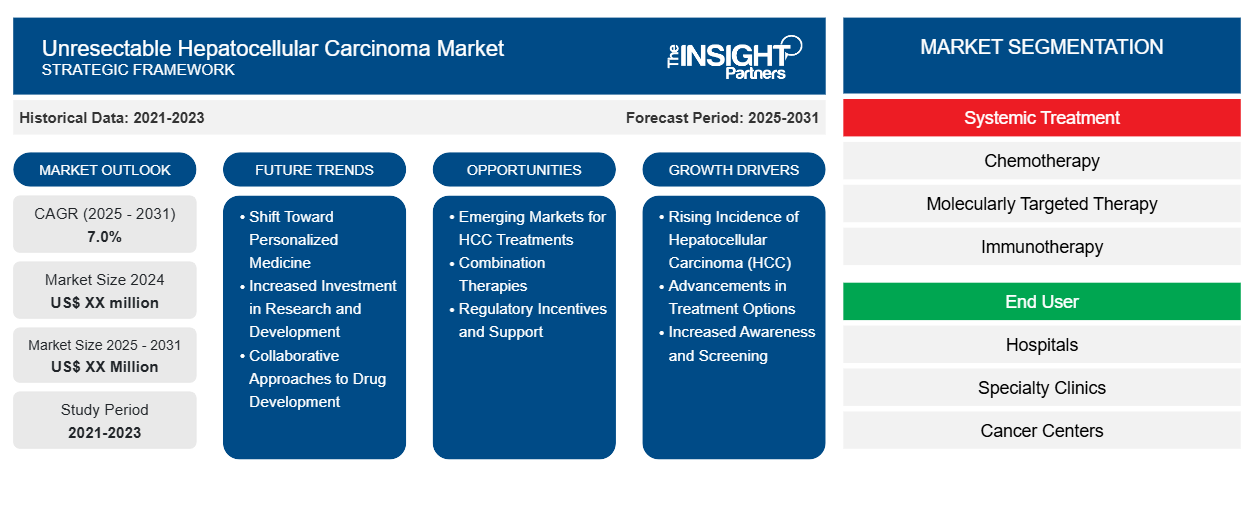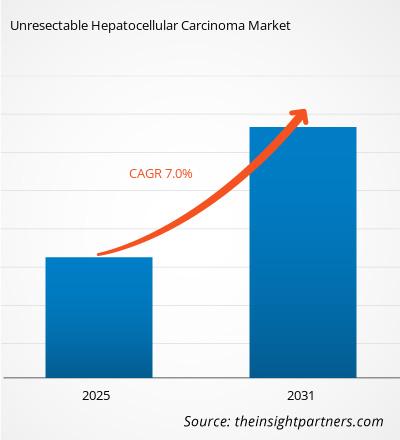The Unresectable Hepatocellular Carcinoma Market is expected to register a CAGR of 7.0% from 2025 to 2031, with a market size expanding from US$ XX million in 2024 to US$ XX Million by 2031.
The report is segmented by Systemic Treatment (Chemotherapy, Molecularly Targeted Therapy, Immunotherapy), End User (Hospitals, Specialty Clinics, Cancer Centers, Research institutes). The global analysis is further broken-down at regional level and major countries. The Report Offers the Value in USD for the above analysis and segments.
Purpose of the Report
The report Unresectable Hepatocellular Carcinoma Market by The Insight Partners aims to describe the present landscape and future growth, top driving factors, challenges, and opportunities. This will provide insights to various business stakeholders, such as:
- Technology Providers/Manufacturers: To understand the evolving market dynamics and know the potential growth opportunities, enabling them to make informed strategic decisions.
- Investors: To conduct a comprehensive trend analysis regarding the market growth rate, market financial projections, and opportunities that exist across the value chain.
- Regulatory bodies: To regulate policies and police activities in the market with the aim of minimizing abuse, preserving investor trust and confidence, and upholding the integrity and stability of the market.
Unresectable Hepatocellular Carcinoma Market Segmentation
Systemic Treatment
- Chemotherapy
- Molecularly Targeted Therapy
- Immunotherapy
End User
- Hospitals
- Specialty Clinics
- Cancer Centers
- Research institutes
Customize This Report To Suit Your Requirement
Get FREE CUSTOMIZATIONUnresectable Hepatocellular Carcinoma Market: Strategic Insights

-
Get Top Key Market Trends of this report.This FREE sample will include data analysis, ranging from market trends to estimates and forecasts.
Unresectable Hepatocellular Carcinoma Market Growth Drivers
- Rising Incidence of Hepatocellular Carcinoma (HCC): The increasing prevalence of risk factors such as hepatitis B and C infections, alcohol abuse, and obesity drives the demand for effective treatments for unresectable hepatocellular carcinoma. As the global population ages, the incidence of liver cancer is expected to rise, necessitating advancements in targeted therapies and innovative treatment modalities to manage this aggressive disease.
- Advancements in Treatment Options: Recent advancements in medical technology and drug development have led to the emergence of new therapies for unresectable HCC. Targeted therapies, immunotherapies, and combination treatments are gaining traction, improving patient outcomes and survival rates. These innovations are pivotal in addressing the unmet needs in the HCC market, driving growth and investment in research and development.
- Increased Awareness and Screening: There is a growing awareness of liver cancer and its risk factors among healthcare professionals and patients. Enhanced screening programs and early detection initiatives contribute to better diagnosis rates. As more patients are diagnosed with unresectable HCC, there is a heightened demand for effective treatment options, further propelling market growth.
Unresectable Hepatocellular Carcinoma Market Future Trends
- Shift Toward Personalized Medicine: The trend towards personalized medicine is reshaping the treatment landscape for unresectable HCC. Tailoring therapies based on individual genetic profiles and tumor characteristics allows for more effective and targeted interventions. This approach not only improves treatment outcomes but also minimizes adverse effects, leading to higher patient satisfaction and adherence to therapy.
- Increased Investment in Research and Development: Pharmaceutical companies are increasingly investing in research and development to discover novel therapies for unresectable HCC. This trend is fueled by the growing understanding of the disease's biology and the potential for innovative treatment modalities, such as CAR-T cell therapy and oncolytic viruses. Such investments aim to address the significant unmet needs in the HCC market.
- Collaborative Approaches to Drug Development: Collaboration between academia, industry, and regulatory bodies is becoming more prevalent in the development of therapies for unresectable HCC. These partnerships facilitate knowledge sharing and resource pooling, accelerating the drug development process. Collaborative research initiatives are likely to yield more effective treatment options and improve patient access to cutting-edge therapies.
Unresectable Hepatocellular Carcinoma Market Opportunities
- Emerging Markets for HCC Treatments: Emerging markets present significant opportunities for the growth of the unresectable hepatocellular carcinoma market. Increasing healthcare expenditures, expanding access to cancer treatments, and a rising incidence of liver cancer in regions like Asia-Pacific and Latin America create a favorable environment for companies to introduce innovative therapies.
- Combination Therapies: The development of combination therapies that leverage different mechanisms of action is a growing opportunity in the HCC market. Combining immunotherapies with targeted agents or chemotherapy can enhance treatment efficacy and overcome resistance mechanisms. This approach may lead to improved survival rates and a more robust therapeutic arsenal against unresectable HCC.
- Regulatory Incentives and Support: Regulatory agencies are providing incentives for the development of therapies for unresectable HCC, including fast track designations and orphan drug status. These supportive measures encourage pharmaceutical companies to invest in research and expedite the approval process for new treatments, ultimately benefiting patients with limited options.
Unresectable Hepatocellular Carcinoma Market Report Scope
| Report Attribute | Details |
|---|---|
| Market size in 2024 | US$ XX million |
| Market Size by 2031 | US$ XX Million |
| Global CAGR (2025 - 2031) | 7.0% |
| Historical Data | 2021-2023 |
| Forecast period | 2025-2031 |
| Segments Covered |
By Systemic Treatment
|
| Regions and Countries Covered |
North America
|
| Market leaders and key company profiles |
|
Unresectable Hepatocellular Carcinoma Market Players Density: Understanding Its Impact on Business Dynamics
The Unresectable Hepatocellular Carcinoma Market is growing rapidly, driven by increasing end-user demand due to factors such as evolving consumer preferences, technological advancements, and greater awareness of the product's benefits. As demand rises, businesses are expanding their offerings, innovating to meet consumer needs, and capitalizing on emerging trends, which further fuels market growth.

Key Selling Points
- Comprehensive Coverage: The report comprehensively covers the analysis of products, services, types, and end users of the Unresectable Hepatocellular Carcinoma Market, providing a holistic landscape.
- Expert Analysis: The report is compiled based on the in-depth understanding of industry experts and analysts.
- Up-to-date Information: The report assures business relevance due to its coverage of recent information and data trends.
- Customization Options: This report can be customized to cater to specific client requirements and suit the business strategies aptly.
The research report on the Unresectable Hepatocellular Carcinoma Market can, therefore, help spearhead the trail of decoding and understanding the industry scenario and growth prospects. Although there can be a few valid concerns, the overall benefits of this report tend to outweigh the disadvantages.
Frequently Asked Questions
- Historical Analysis (2 Years), Base Year, Forecast (7 Years) with CAGR
- PEST and SWOT Analysis
- Market Size Value / Volume - Global, Regional, Country
- Industry and Competitive Landscape
- Excel Dataset
Recent Reports
Testimonials
Reason to Buy
- Informed Decision-Making
- Understanding Market Dynamics
- Competitive Analysis
- Identifying Emerging Markets
- Customer Insights
- Market Forecasts
- Risk Mitigation
- Boosting Operational Efficiency
- Strategic Planning
- Investment Justification
- Tracking Industry Innovations
- Aligning with Regulatory Trends







 Get Free Sample For
Get Free Sample For